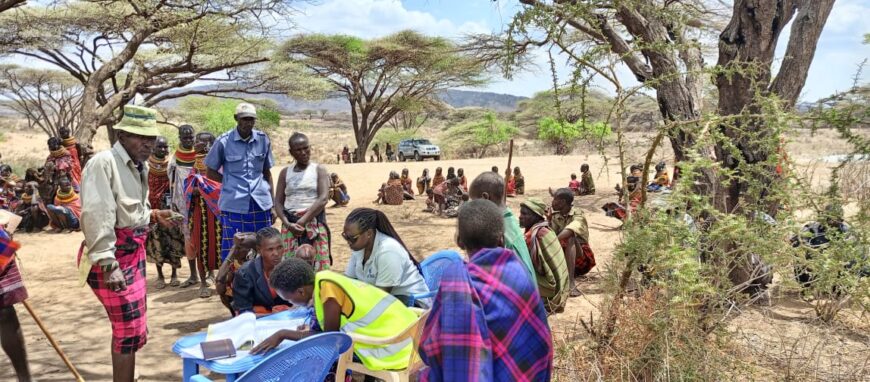In 2023, the state of food security in Kenya had deteriorated, mainly in the Arid and semi-arid Lands (ASAL) counties. The number of people in need of humanitarian aid due to severe food insecurity had risen significantly to 4.4 million. These individuals were classified as being in crisis and emergency (IPC Phase 3 and 4). This marked an increase from the 3.5 million people identified during the 2022 long rains assessment, indicating a general decline in food security across the 23 ASAL counties. Unfortunately, the situation was expected to worsen during the long rainy season due to the forecasted below-normal rains that would result in drought. As a result, by June of 2023, 5.4 million people faced acute food insecurity.
In Samburu County, there are currently 156,700 people who require assistance due to drought conditions. According to the National Drought Management Authority (NDMA) sentinel data for January 2023, households in the area have resorted to various coping strategies. They included consuming less preferred or cheaper food, reducing the size of their meals, and borrowing from their neighbours.
Treza Badi 1 is a 39-year-old widow living in Lengusaka village, located in Samburu East Sub County. Samburu is an arid and semi-arid region where the pastoralist community primarily relies on cattle for their livelihood. Unfortunately, Samburu has the highest malnutrition rate among all the ASAL counties. The region has a population of 347,336 and a Global Acute Malnutrition (GAM) rate of 15.8%.
Acted conducted a phone-based post-distribution monitoring exercise where Treza shared that life was becoming increasingly difficult due to the prolonged drought. The rise in food prices had made it challenging for her to get enough food, and there was no one to help her provide for her children since her husband had passed away a long time ago. Previously, she received some support in the form of relief food from the county government through the chief’s office, but that was not enough, and it did not last for long.
After a difficult period, Treza’s life improved when she was chosen to receive food assistance in the form of unconditional cash from Acted, through a project funded by USAID/BHA in partnership with PACIDA. She was selected based on a vulnerability criterion that prioritizes vulnerable groups like widows, the elderly, pregnant or lactating, and the malnourished. Through this program, she was able to pay off her debts, provide food for her family, and start a small vegetable-selling business in the Lengusaka market.
Treza’s main source of income used to be selling charcoal and firewood. However, this was not only tedious but also unreliable as she had to wait until market days to find customers. Fortunately, she received cash assistance for four months and used the money to buy food and start a small business, selling vegetables during market days to generate income.
- Beneficiary’s name has been changed to protect their identity.
The cash received from Acted enabled me to buy food and start a small business. The most important thing about my small business is that it allows me to provide my household with food and other necessities daily.
Treza and her children used to live in a small manyatta (traditional Kenyan hut), which was going well until the El Nino rains began. Water started leaking into her house through the porous roof, causing discomfort and wetting her belongings. After receiving cash assistance, she used some of the funds to renovate her home to make it more hospitable. She purchased a small heavy gauge polythene sheet to cover her roof and protect her family from the rain. The cash transfer significantly improved her household’s economic situation.

Treza and her children used to live in a small manyatta (traditional Kenyan hut), which was going well until the El Nino rains began. Water started leaking into her house through the porous roof, causing discomfort and wetting her belongings. After receiving cash assistance, she used some of the funds to renovate her home to make it more hospitable. She purchased a small heavy gauge polythene sheet to cover her roof and protect her family from the rain. The cash transfer significantly improved her household’s economic situation.